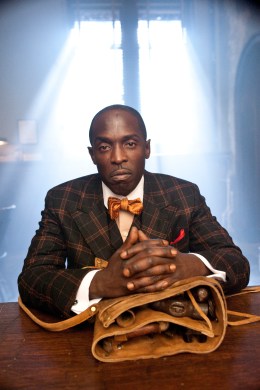
SPOILER ALERT: Before you read this post, curl up next to a nice bookcase and watch last night’s Boardwalk Empire.
Fans of The Wire had to be waiting for Boardwalk Empire, with its sprawling storylines, to finally spotlight Michael K. Williams, who stood out in HBO’s earlier series as principled bandit and robber of drug gangs Omar Little. Boy, did this episode ever, giving him a scene that all but had the Emmy-submission postage stamped on it—but also demonstrated that, in Chalky White, Williams is not just playing Omar II.
Vengeance was Omar’s game too, of course, and a personal one, from the first season of the show in which his lover was tortured to death by the Barksdale crew. But while Chalky’s cause is personal here as well—seeking payback for the lynching of one of his men—it’s also, here, lifelong. Sitting down with the captive Klan Cyclops, Chalky takes his time delivering the story of his own father’s lynching, a monologue with a lifetime of quiet seething built into it. It’s a story he seems to have been waiting a lifetime to tell: of walking in, a little boy, to see the luxurious bookcases, scrolled and embellished with angels—a wooden Heaven, “the most beautiful thing I’ve ever seen”—that his daddy built for a white man, soon after to be strung up from a pepper tree for being too good at what he did. He then produces his father’s tools and announces what he’s going to do with them: “I ain’t building no bookcase.”
(His target, ironically, owns a hardware store.)
But where Omar was a rogue, operating outside a system and striking where he could, Chalky is a system: a powerful man, with his own organization and 20% of Atlantic City’s vote in his back pocket. He’s striking back—at the wrong guy it turns out—but not just for himself. He has people to take care of, and defend, and he has the need to show that (in a society not yet too interested in justice for black folks) that he can deliver the guilty party. Williams invests Chalky here with a sense of importance and sensitivity to the image he must project, as well as a personal rage. He probably could have pleased a crowd simply playing the role as “Omar back,” but his Chalky is consummately a boss, and a businessman (it is, unbeknownst to him, his business that made him the lynching’s target) and that is Williams’ real accomplishment here.
Elsewhere, “Anastasia” expands Empire’s political world, placing Nucky in the larger context of New Jersey politics, where he impatiently pushes for the money to finance roads that will bring new auto traffic from New York and Philadelphia. (And will enable truck traffic for, you know.) Here, as in his dealings with the mob, you get the sense that Nucky is usually the smartest man in the room—he alone realizes that women’s suffrage is a reality male politicians will have to get used to—but also that being the smartest guy in the room is not in itself enough.
The title of the episode comes from the story, which captured the world’s attention at the time, of the woman who claimed to be the last surviving daughter of the Romanov family in Russia, executed in the revolution against the czar. Margaret is fascinated with the story, which she shares with her children, then saddened to find out that it’s ruled a hoax—just as, we sense, she is disillusioned to realize that Nucky is another politician trafficking in corruption and looking to score (off Prohibition, among other things).
In a way, the Anastasia story brings together the disparate stories of Margaret and Chalky, who have barely brushed by each other. Each of them has seized upon a story they needed to believe (in Chalky’s case, the guilt of the Grand Cyclops). And each story involves the loss of a childhood illusion, against the backdrop of a town that can’t replace those illusions, but can only offer new ones.
Now for a quick hail of bullets:
* We find Jimmy, meanwhile, having run off to Chicago to get back on his feet with Al Capone—who wakes him up by firing a gunshot past his ear first thing in the morning. It’s always tempting to find parallels between this show and The Sopranos, but Capone’s dumb, childlike sadism—take it easy, Princeton, I was just fuckin’ with you—is definitely a familiar Sopranos type, recalling Ralphie Cifaretto at his most out of control.
* While Margaret may be gradually losing her illusions, realizing that Nucky is something much different from the nice man who addressed the temperance league, she is interestingly not entirely put off by it. At Nucky’s “surprise” birthday party for himself, she proves more canny and sophisticated—and not just about the drinking going on around her—than we would have thought on first meeting her.
* I’m especially interested to see how the political issue of suffrage, just around the corner, continues to develop alongside Prohibition. The two causes were genuinely linked, both of them advocated by many of the same reformers and feminist activists. But they’re also thematically similar: each one can be viewed as a threat and fought against (as Nucky’s fellow pols resist the women’s vote) or they can be viewed as a tremendous opportunity for those willing to act quickly—which seems to be how Nucky sees each one.

